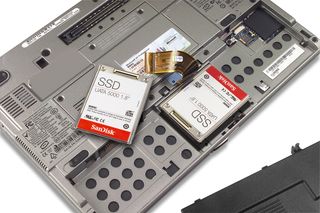SSD Capacity Battle Heating Up

There's no doubt that SSD drives are improving day to day. One major area that SSD manufacturers are focusing on is drive capacity. Mainstream SSD drives tend to be limited to 80 GB or less for affordability. There are drives that have larger capacities, but the cost is significantly higher than a similar HDD, which is what is keeping SSD drives out of the hands of many at this point.
Despite this, capacities are ramping up fast!
Intel is prepped and ready to start shipping 160GB offerings of its 2.5-inch X25-M solid-state drive. The company plans to launch a 160GB 1.8-inch version, the X18-M SSD, next month. It’s no secret that Intel’s solid-state devices are speedy, but the bigger question is whether Intel has enough clout to get its products into consumers’ hands. The catch? Rivals Samsung and Toshiba have stepped up to the place with some bulky offerings of their own.
Samsung is coming into the picture with a clear SSD roadmap well into 2009. The company has already begun mass-producing 256GB multi-level cell drives as of late November, which should become available to consumers around a similar time as Intel’s X18-M SSD. And if that’s not enough, Samsung expects to have 512GB SSDs out the door in 2009 as well.
Toshiba, whose 256GB SSD offerings pull in nearly half the maximum read and write speeds of Samsung’s, is pushing toward high-capacity as fast as the company can go. It’s already announced that it will be debuting the world’s first 512GB SSD at the 2009 Consumer Electronics Show. The company claims that this new generation of MLC SSDs—also including 64GB, 128GB, and 256GB versions—should be able to hit maximum read and write speeds of 240 MB/s and 200 MB/s respectively. If true, that will make these drives the fastest MLC-based drives you can buy. Given Toshiba’s SSD track record, we’ll wait and see.
Pricing will be the final factor that helps determine which drive ultimately wins out. But with all three expected to reach the thousand-dollar price tag (more for Samsung’s 512GB offering: $1,652), will questions of performance and size ultimately matter? High solid-state storage prices are still a tough pill for consumers to swallow given the comparatively inexpensive price of magnetic storage. For the enterprise market, however, a giant capacity could very well win the day.
For the notebook market, we're expecting to see SSD drives make a big splash here, sooner than on the desktop market.
Stay on the Cutting Edge
Join the experts who read Tom's Hardware for the inside track on enthusiast PC tech news — and have for over 25 years. We'll send breaking news and in-depth reviews of CPUs, GPUs, AI, maker hardware and more straight to your inbox.
-
JeanLuc If the 128Gb models become affordable next year I might treat myself to one of these speed demons!Reply -
zodiacfml i would love a 32/64GB SSD with 200MB/s read for less than $100. i'm frustrated with the slowness and especially noise of my system drive in vista.Reply -
ossie @zodiacfml Then you'll have the unique opportunity to ditch vishta for a real OS. No SSD will make microsuxx' crap fly...Reply
-
descendency The problem with MLC drives up until now is the wildly variable speeds you receive. While the manufacturer claims 150+ mb/s read, that's only under certain cases. The write might also claim 100+ mb/s but that's only under certain cases.Reply
Most real world benchmarks make MLC drives look like trash. My fear is that the core of the technology is to blame. SLC flash does not have the same problems, but is drastically more expensive right now. -
I love this just so hard drives get cheaper! I saw a 1tb hard drive the other day for $90! SSD seem really cool, but I probably won't get one for at least a year, maybe two.Reply
-
JonnyDough A lack of demand for hard drives would cause a surplus, lowering prices on HDDs. However, SSDs have only a tiny fraction of the market right now. HDDs are cheap for other reasons, such as competition, market saturation (there's a zillion to choose from) and improved capacity/longevity. If you have a TB of storage use very little of it, and it lasts you 7 years do you need to buy another drive? Probably not. This is what causes lower costs. HDD manufacturers have also found ways to lower costs, using smaller processes for the controller chips found inside the drives, and so on.Reply
I agree with descendency in that the hearsay about MLC drives is enough to stop many people from jumping on board with SSDs. If you can't be sure what you're getting, it's better to just wait until something is fast and affordable and you know it's good. As long as places like Tom's keep reviewing the cheapest drives, telling us how to tweak them for our OS so they work right (most of us are still on XP) we will begin to start using them. Until then, HDDs are tried and true and cost only pennies per GB. -
JonnyDough That first paragraph was in response to this:Reply
I love this just so hard drives get cheaper!
-
Grims You are bias against SSDs as shown in your last article that very little functional terminology...and it just seeps out on this one. Who cares if a 512GB drive cost 1600 dollars? A couple a years a go a 32GB SSD cost that!Reply
Most Popular



